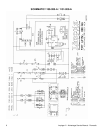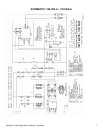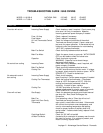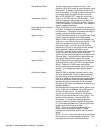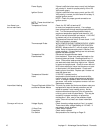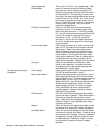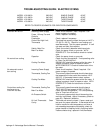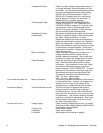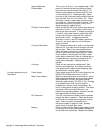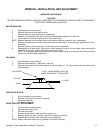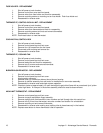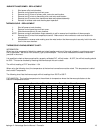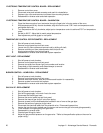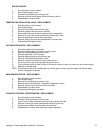Impinger II – Advantage Service Manual - Domestic
14
Temperature Control Check for supply voltage at temperature control. If
no voltage is present, trace wiring back to hi-limit
thermostat. Turn the temperature adjustment knob
to maximum temperature position and check for
208/240 VAC at the load terminals 7 and 8. If
208/240 VAC is present and unit is not heating,
refer to "Mercury Contactor" for next check. If
208/240 VAC is not present, proceed.
Thermocouple Probe WITH POWER ON AND THERMOCOUPLE
LEADS ATTACHED TO THE TEMPERATURE
CONTROL BOARD: measure D.C. millivolt output
of these leads. Refer to thermocouple chart in
Section D for proper readings. If these readings
are not achieved, replace thermocouple.
Temperature Control
Potentiometer
Disconnect the potentiometer leads from the board.
Place ohm meter test leads on the blue and green
pot. leads. Reading should be 1 K ohms.
Place meter leads across the blue and purple pot.
leads and rotate knob from high to low. Repeat on
green and purple leads. Check for even rise and
fall of ohms reading to insure that there are no open
or dead spots in the potentiometer. Check each
lead to ground for shorts. Replace pot if it does not
meet the above test.
Mercury Contactor Check for supply voltage to the contactor coil. If
voltage is present and the contactor will not
activate, replace the contactor. Also, check each
contactor for proper high voltage input and output.
Heater Elements Check the amp draw on each hot leg for proper
load. Check the specifications plate for rating
information. If the amp draw is low or high, check
the individual elements for opens, shorts, and
proper resistance. WITH POWER OFF: To check
resistance of the elements, remove all leads from
the elements and use an accurate digital VOM.
The element resistance should be as follows:
208V - 27 ohms approximately
240V - 36 ohms approximately
Oven heats with switch off Mercury Contactor The mercury contactor has probably malfunctioned
in the closed position. If there is no voltage to the
operating coil, but there is high voltage at the
contactor out put, replace the mercury contactor.
Intermittent Heating Thermal/Overload of motor The main fan motor is equipped with internal
thermal protection and will cease to operate if
overheating occurs. As the motor overheats and
then cools, this will cause the oven to cycle on and
off intermittently. This may be caused by improper
ventilation or preventive maintenance. Also, most
of the problems listed under "Oven will not heat"
can cause intermittent failure.
Conveyor will not run Voltage Supply Check incoming voltage supply at line 1 to neutral.
There should be a voltage reading of 208/240 VAC.
If not present, check breakers.
10 Amp Fuse Check and/or replace.
Fuseholder Check and/or replace.
Fan Switch See procedure for checking on page 8.



